I had been in Domoni—an ancient, ramshackle trading town on the volcanic island of Anjouan—for only a few summer days in 2018 when Onzardine Attoumane, a local English teacher, offered to show me around the medina. Already I had gotten lost several times trying to navigate the dozens of narrow, seemingly indistinguishable alleyways that zigzagged around the old town’s crumbling, lava-rock homes. But Onzardine had grown up in Domoni and was intimately familiar with its contours.
Stocky in build, with small, deep-set eyes and neatly trimmed stubble, Onzardine led me through the backstreets, our route flanked by ferns and weeds sprouting from cracks in the walls and marked by occasional piles of rubble. After a few minutes, we emerged onto a sunlit cliff offering views of the mustard-colored hills that surround the town, dotted with mango, palm, and breadfruit trees. We clambered down a trail, past scrawny goats foraging through piles of discarded plastic bottles, broken flip-flops, and corroded aluminum cans, toward a ledge where a dozen young men were waiting for the fishing boats to return to shore, gazing blankly out across the sea.
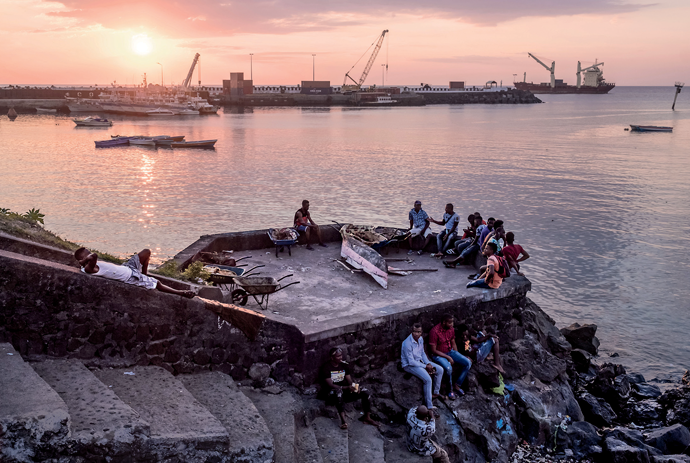
Comorians resting on the waterfront in Moroni, the capital of the Union of the Comoros. All photographs from the Comoro Islands, August 2019, by Tommy Trenchard for Harper’s Magazine © The artist
Stone paths soon gave way to dirt tracks. On a low, concrete wall, a man in a faded, dirt-caked T-shirt sat hunched, staring out toward the water with wild eyes. Onzardine beckoned me to follow him up a sheer slope of dusty soil to the remnants of the city’s sixteenth-century defenses. Together, we too looked out over the swell of the ocean. Toward the southeast, the faint outline of another island, Mayotte, some fifty miles away, glowed like a mirage through the haze.
Anjouan is one of three main islands that make up the Union of the Comoros, a tiny nation of fewer than a million people set in the warm waters off the eastern coast of Mozambique. One of the world’s least-visited countries, the Comoros is best known as the home of the West Indian Ocean coelacanth, an ancient fish once thought by scientists to have gone extinct sixty-five million years ago, though Comorian fisherman had been regularly catching them for as long as anyone can remember.
Largely cut off from the global economy, most Comorians make their living through subsistence agriculture. Government corruption and nepotism are endemic, public services are woefully inadequate, the natural resources on which the country’s largely rural population relies—fresh water, arable land, fisheries—are critically depleted, and the average per capita income is little more than a thousand dollars per year. Since 1975, the Comoros has seen more than twenty attempted coups.
Mayotte, by contrast, belongs to one of the world’s wealthiest nations. Despite being some five thousand miles from Paris, the shimmer of land that Onzardine and I could see across the straits was bona fide French soil. The outpost has representatives in the French parliament, is subject to French law, uses the euro, and enjoys benefits of European Union membership.
Crossing the waters before us had become the overriding goal of most ambitious young Comorians. The sea was calm that day, but in recent years thousands have drowned in attempts to reach Mayotte on flimsy fiberglass boats known as kwassa-kwassa. A 2012 report by the French Senate put the death toll since 1995 at between seven and ten thousand. More recently, Comorian officials have said that the true figure could be as high as fifty thousand, an estimate that would make the crisis comparable in scale to that in the Mediterranean. Without documentation, those who succeed in crossing live a precarious existence on Mayotte, unable to work legally, forever hiding from the authorities.
The longer I stayed in the archipelago, the more I began to think of it as a microcosm of a planet nearing its breaking point. It became impossible not to see the islands’ increasingly familiar constellation of problems—a rapidly growing population, the unsustainable exploitation of resources, climate change, economic inequality, and the ensuing mass migration from the poor world to the rich—as a blueprint for many crises to come.
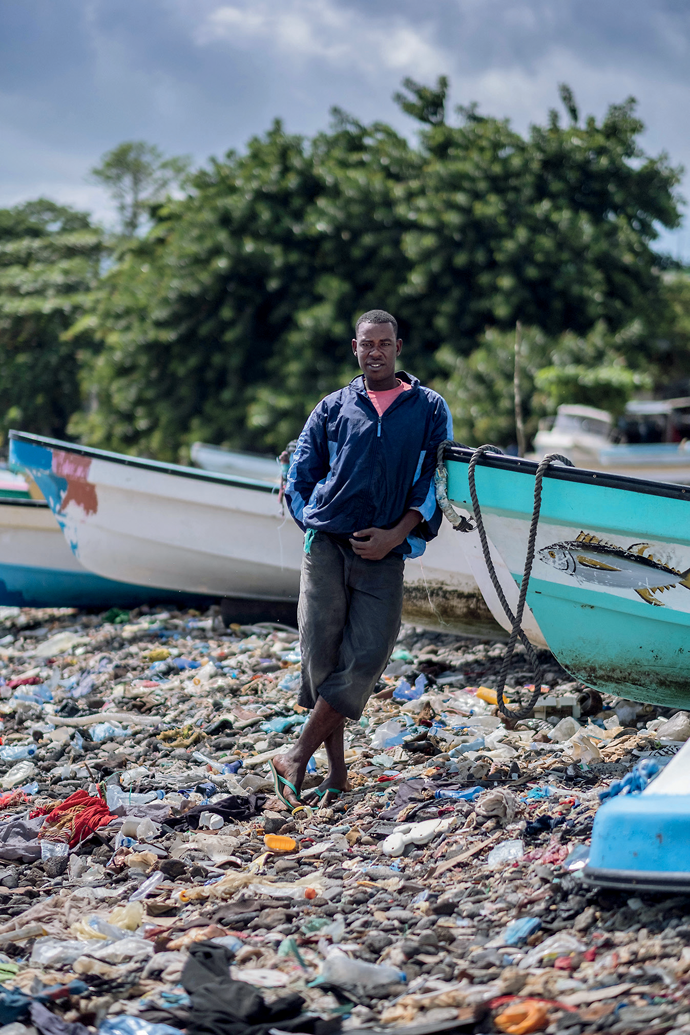
A former smuggler who transported migrants to the French island of Mayotte, pictured in Anjouan
Reaching Mayotte wasn’t always so difficult. The four islands of the Comoros archipelago—Grande Comore, Mohéli, Anjouan, and Mayotte—have been inhabited for over a thousand years, first by mainland Africans and Southeast Asians, followed by Arab and Indian traders and, eventually, European settlers. The archipelago was traditionally ruled by an assortment of rival sultans and chiefs, with power and influence shifting among towns and islands, though their diverse populations shared the same Sunni Islamic faith and spoke dialects of the same Shikomori language. Situated advantageously between Madagascar and the African coast, the islands’ inhabitants dealt in everything from rice to slaves, first with Arab merchants and later with French, British, and Dutch trading companies.
With the opening of the Suez Canal in 1869, however, the majority of the maritime traffic on which the islands depended disappeared. Almost overnight, the archipelago was transformed from a comparatively prosperous trading hub into a forgotten backwater. By 1886, having been drawn into the territorial scramble between European powers seeking farmland and regional military footholds, all four of the islands were either protectorates or colonies of France.
In 1974, following decades of political agitation, the French government permitted a referendum on the question of independence. While 95 percent of the total votes were cast in favor, a majority on Mayotte voted to remain part of France. Intent on retaining Mayotte for itself, the French chose to interpret the results on an island-by-island basis, and the archipelago was split in two. The decision was fiercely criticized by both the Comoros, which saw Mayotte as Comorian, and the United Nations, which claimed that France had violated the principle of territorial integrity. France, in turn, cited the right of Mahorans—as citizens of Mayotte are called—to self-determination. Two years later, Mayotte reaffirmed its decision in a second referendum. In 2011, the island was granted the status of a full overseas department of France.
By that time, Comorians had already been dying at sea for well over a decade. In 1995, the French prime minister Édouard Balladur, seeking to stem the rush of immigration that was already flowing from the Comoros, introduced a visa requirement for all Comorians visiting Mayotte. The Balladur visas, as they are universally known, were, and remain, almost impossible to obtain without high-level connections, so most Comorians were forced to travel in secret by kwassa-kwassa, leading thousands to their deaths.
One of the dead was Onzardine’s cousin Bacar. The two had grown up in the same household, like brothers. Like many in Onzardine’s family, Bacar became a fisherman, but he decided to switch careers when he realized that he could earn as much smuggling a single group of migrants to Mayotte as he could fishing for an entire month. At his busiest, and assuming the weather cooperated, Bacar made as many as three crossings a week. On a stormy Friday in 2016, after he had dropped off his passengers safely in Mayotte, Bacar’s engine failed. “He called us and said his motor had broken,” Onzardine’s mother told me. “He said he was alone at sea and needed help. When we called him back, his phone wasn’t working. We called people to help him, but it was too late.” Fishermen searched for Bacar’s boat for ten days, finding no trace.
During my week in Anjouan, Onzardine and I met a dozen families mourning children, parents, and siblings whose boats never reached Mayotte. Some of those who died were fishermen turned smugglers like Bacar, but most were passengers trying to sustain their families amid economic hardship and agricultural and environmental decline. Over the past twenty-five years, Anjouan has lost 80 percent of its forests, cut down by farmers moving higher and higher up the island’s slopes in search of fertile land. This has led to the erosion of much of the topsoil, which has further exacerbated the situation, and, in tandem with changing weather patterns, has contributed to the disappearance of up to three quarters of the island’s rivers. One such river, Onzardine told me, used to be so deep that he and his friends could leap into it from a high bridge without hitting the bottom. Now it’s been reduced to a two-inch-deep trickle.
Government services on the islands are patchy at best—trash collection is virtually nonexistent, power outages are commonplace, the national health service suffers from a lack of equipment and expertise, and standards of education are so poor that, according to UNESCO, about 40 percent of the adult population cannot read or write. Medical conditions requiring ongoing treatment, such as diabetes, can be financially ruinous, and cancer is more or less a death sentence. Onzardine’s uncle, who is diabetic, has twice had to board a kwassa-kwassa to Mayotte to receive care. When Onzardine and I visited the hospital in Domoni, there appeared to be only a single patient.
Perhaps because of what had happened to Bacar, or because I had heard so many other migration horror stories that week, I had assumed that Onzardine wanted to stay in Anjouan. Unlike many of his peers, he had managed to graduate from university and find a job. So I was surprised when he confided to me before I left that he, too, was dreaming of making it to Mayotte. Onzardine explained that the school where he taught had not yet begun paying him—public-sector workers are often forced to wait years before receiving their first paycheck. Moreover, he told me, you really needed two or three jobs to be comfortable, and given his humble background and lack of connections, he couldn’t hope for much. In Mayotte, an English teacher could earn as much in a month as Onzardine could hope to save after several years of work in the Comoros—if, that is, his school ever started paying him.
Onzardine also wanted to marry. A typical grand mariage—the extravagant celebration that dictates a man’s status in Comorian society—costs tens of thousands of dollars and lasts for two weeks. (Onzardine and I attended one in Domoni that had cost over 35,000 euros. It included a public bullfight, held in the main square in front of the sultan’s palace, which was not even included on the official schedule.) Onzardine had been with his fiancée, Halima, for five years, but still lacked the five or six thousand euros he estimated he would need for an appropriately lavish ceremony.
At week’s end, before flying out of the Comoros, I asked Onzardine if he was nervous. “It’s a big risk,” he admitted, “but it’s better to take a risk than to do nothing.” He promised he would try to avoid bad weather. As the plane shot smoothly over the jagged, volcanic coastline and climbed over the sea beyond, I imagined Onzardine huddled in an overcrowded kwassa-kwassa, crashing through the waves, his eyes squinting against the spray.
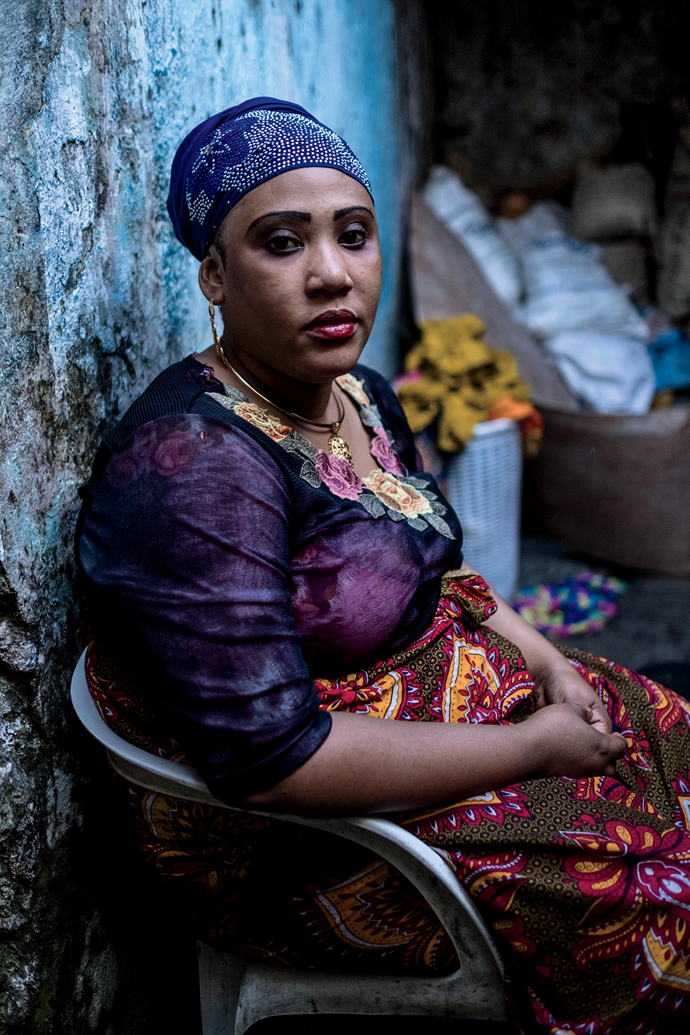
Mounira Saindou, one of six survivors from a failed transport of forty-six migrants, found after ten days adrift at sea.
One year after my first meeting with Onzardine, I returned to Anjouan. My plan was to take the migrant route to Mayotte via kwassa-kwassa, and I set about finding a smuggler. They were not hard to find—every village along the coast had at least one, and everyone knew who and where they were. I stayed in the capital, Mutsamudu, a decrepit port whose defining feature is a large whitewashed fort built in the eighteenth century to guard against marauding Malagasy pirates. Men wearing long white robes and cadmium-yellow kofias wandered the warren of the old medina, and teenagers chatted by the waterfront, the gray sand of the beach obscured by an ankle-deep layer of trash. Just offshore, fishermen guided their boats past the rusting wreck of a trawler.
The situation on Anjouan had grown even bleaker. The previous summer, the president of the Comoros, Azali Assoumani, had cracked down on opposition parties and amended the constitution to enable himself to stay in power through 2030. A few months later, rebels had fought fierce gun battles against government troops in Mutsamudu’s medina, resulting in a handful of deaths. The uprising had been put down by the time I arrived, but mysterious explosions were still going off by night throughout the town and the surrounding villages.
My translator on this visit was an unemployed plumber named Anzize Soilihi. We took a taxi to the village of Ouani, north of the capital, where I hoped to find a ride to Mayotte. We walked down to the wharf, where colorfully painted kwassa-kwassa bobbed offshore. A mural on a nearby wall depicts migrants being devoured by sharks in a rough sea and reads: the balladur visa kills comorians. A stick figure in a boat with french police written across the hull was firing at the figures in the water, and a crudely drawn helicopter circled above.
I asked an old man resting in the shade of a tree where I might find a smuggler. “You must talk to the commandant,” he replied, gesturing to a young man in a baseball cap sitting on the hull of an overturned boat. The “commandant”—he identified himself as “Boss”—said that he would be happy to take me to Mayotte for the sum of 1,500 euros, an offer that was quickly reduced to 500 and a bottle of whiskey after he saw my expression of disbelief. He added, apologetically, that it would not be possible to give me a receipt, but assured me that the voyage would be safe. We would travel by night, he explained, and wait off the coast of Mayotte until his contacts onshore gave him the all clear. Boss boasted that he could fit thirty passengers on his boat, and then asked again for whiskey. I decided to check out his competitors before making a decision.
In the neighboring village of Mirontsi, I waited out of sight while Anzize negotiated terms with another smuggler who said he’d bring me to Mayotte for 400 euros. He took a maximum of twelve people in his kwassa-kwassa, which would leave before dawn the next day. He also offered a guarantee: if the French patrol boats intercepted us before making landfall, once we had been deported back to Anjouan he would take us again for free. That afternoon I walked through the cool streets of the medina and found a shop where I bought a life jacket, along with a crate of water and some biscuits in case our engine cut out and left us adrift. Then I retired to my hotel, opened a can of warm, unpleasant beer, and waited.
I woke to the sound of my alarm at two-thirty in the morning. I packed my life jacket, water, and supplies, wrapped my bag in several watertight trash bags, and set off to Mirontsi. Anzize phoned and confirmed that he was on his way, but he sounded worried—it was too quiet, he thought. When I reached the wharf, it was deserted.
I called Anzize back several times, but his phone seemed to be off. After forty minutes, I gave up and trudged the mile and a half back to Mutsamudu. Back in my hotel, I tried him again, with the same result. The sun came up, and by the time my phone rang, it was almost midday. Anzize told me he had been arrested. The police had accused him of being behind a spate of explosions that had gone off over the previous days, and only after searching him thoroughly and interrogating him for several hours did they conclude that he was not an insurgent.
That night, I soon learned, the police had raided smugglers all over the island, confiscating their motors and taking them in for questioning. Fishermen who witnessed the arrests told me that the police had claimed the boat captains were transporting mercenaries and weapons in an effort to overthrow the government on Grande Comore. For many Anjouanais, the crackdown had not only become another obstacle to leaving—it had become a further reason for doing so.
I decided to wait for another opportunity to cross, but the arrests continued, and the smugglers stayed in hiding. Stories emerged of brutal beatings inside police stations. Drivers and fixers grew too afraid to work with me. One fixer told me he suspected the staff and guests at my hotel were spies, and that a friend of his, a teacher whose brother-in-law was a smuggler, had just been released by the police with bruises all over his body and two broken fingers. I decided I should leave before I got anyone hurt.
In the end, a journey that would have taken many dangerous, uncomfortable hours and cost 400 euros took exactly twenty minutes at less than half the price. I looked out the window of the twin-propeller Embraer feeling the full weight of the privilege bestowed upon me by my British passport. I searched for kwassa-kwassa amid the featureless ocean, but saw nothing. At the immigration counter in Mayotte, a border official glanced at my documents and welcomed me to France.
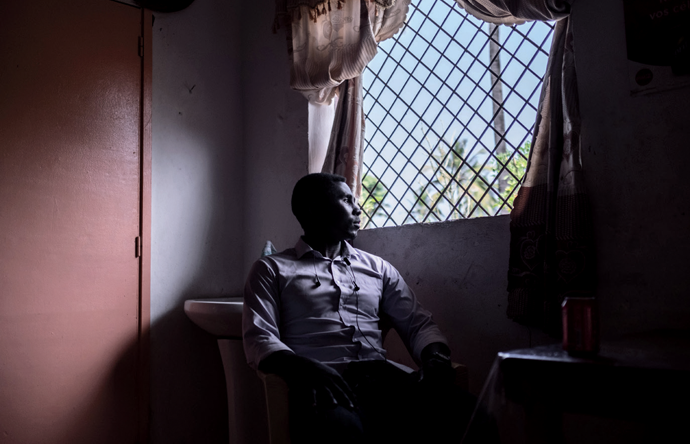
Onzardine Attoumane at a café on the outskirts of Domoni, on Anjouan
On Mayotte, the women peddling grilled meat at the side of the road sold plump, aromatic chicken breasts and legs, instead of the scrawny imported wings on offer on Anjouan. Instead of kwassa-kwassa moored in the harbor there were sailboats and a handful of police patrol vessels, instantly recognizable from the graffiti in Anjouan. Trinkets and souvenirs filled the shelves of boutiques by the ferry terminal, and behind them stood shops, hotels, and office blocks that looked almost space-age after the dilapidated, weatherworn townscapes of the Comoros.
The area around the ferry terminal formed the heart of the island’s capital, Mamoudzou. It was also the scene of a daily struggle between the French security forces and vendors from Mayotte’s rapidly growing foreign population, which now constitutes 48 percent of the island’s inhabitants. The past few years have seen a growing influx of migrants from as far afield as Central Africa and the Middle East, but the vast majority, some 95 percent, are Comorians. Of these, around half are on Mayotte illegally, sans papiers.
Each morning migrants assembled outside the terminal to sell printed fabric, bags of onions, and knockoff shoes to the traffic coming and going from the ferry. Their merchandise was laid out on sarongs, so that it might be quickly bundled away. Every hour or so, police patrols swept through the square, the migrants parting before them like baitfish pursued by a predator. Those who weren’t quick enough were herded into police vans, sirens blaring, and carted away to be processed. If they lacked residency papers, they were sent to a detention center to await deportation. It felt like a war zone, albeit one conveniently ignored by the island’s legal residents, who went about their daily business as if nothing at all unusual were happening.
The only places offering a modicum of security for undocumented migrants were the slums, known as bangas, that spilled up the hillsides behind the coastal towns, where the paths were too steep or too narrow to allow police vehicles to enter. Patrols still ventured in on foot, but a system of lookouts ensured that there was usually plenty of time to escape.
In a tin lean-to above a town called Kaweni, home to what the aid group Médecins du Monde has called the largest slum in France, I met a family who had been in Mayotte for three generations. Saltoun Ali Abdullah, the matriarch, had been living here prior to the Balladur visa restrictions. Her husband had been deported twenty times, and each time he had returned. Some of her thirteen children and dozens of grandchildren, almost all of whom were born on Mayotte, had managed to acquire French citizenship, but others had not. Many of them were also not enrolled in school, despite a French law that makes schooling obligatory for anyone on French soil between the ages of six and sixteen, irrespective of their legal status. She said the school staff needed an address for each student, but they had no address in the banga.
Outside the shack, children played with toy cars made from sardine tins and bottle caps, and beside us one of Saltoun’s grandchildren, two-year-old Najma, slept on an old couch cushion in the dirt. Flies covered her face, crawling inside her nostrils and feeding on the deposits around her eyes. She looked sick. Najma was a French citizen, but this had done little to improve her circumstances. Saltoun sold cassava roots and bananas that she and her family farmed to try to make a living, but they were still often left with no food at all, and water had to be lugged up the hill in jerricans from a roadside tap. When Najma or the other children fell ill, Saltoun told me, she could not take them to the hospital without running the risk of deportation, so the family made do with over-the-counter medicine from a local pharmacy.
Our conversation was punctuated by periodic shouts of “PAF!” from over a corrugated metal fence, sending a reflexive wave of tension through the family. PAF is the French acronym for the hated border police who patrol these areas—the Police aux Frontières. They’re not legally allowed to enter private property without a warrant, but several of Saltoun’s family members told me that they regularly did so anyway. Saltoun said it made the children cry.
Above us loomed a series of gleaming white apartment blocks with views over both the bangas and the broad sweep of the ocean. “If we had papers, maybe we could live like that,” said Saltoun. “It’s painful. We’re always jealous.” She looked down at Najma, sleeping on her cushion. “What kind of government allows this? Can you imagine a French child suffering like this?”
I asked whether she ever thought about moving back to Anjouan, but she said that prospects would be equally hopeless in the Comoros. Anyway, after decades on Mayotte, the island had become home—for many of her children, the only one they’d ever known. But though she had been filing residency applications for more than two decades, Saltoun had yet to receive a single reply. It wasn’t helping matters that she was illiterate and spoke no French, leaving her unable to fill out the required paperwork without assistance from family or friends.
Since 2014, France has enacted a series of laws that have left migrants in Mayotte with fewer protections than their counterparts in the rest of the nation. Changes to the process through which children born in French territory can gain citizenship have tightened the requirements for Comorians born on the island. Similarly, while migrants to mainland France in possession of a carte de séjour, a residency permit, are typically free to travel throughout the country, those permits issued in Mayotte do not generally grant the same privileges. Foreigners in Mayotte are also denied the right to request a delay of twenty-four hours before being deported, a privilege granted to migrants on the mainland. Consequently, the majority of those sent back to Anjouan do not manage to see a lawyer, let alone a judge. Rights groups say that what protections do exist for the migrants are often disregarded given the pace and scale of the island’s deportation machine, with tragic results—children separated from their parents, and people being deported to a country in which they’ve never before set foot.
In the eyes of many Mahorans, however, the government should have been doing even more. Hedja Ben, a twenty-eight-year-old delivery driver, told me that Mayotte was “suffocating” and described feeling “submerged by a wave of foreigners.” Like almost all the legal residents I spoke to, he drew a familiar connection between the increase in undocumented migrants on the island and what he saw as a rising crime rate. (Crime rates had actually fallen for two consecutive years.) “All the illegal people here get deported, but the kids stay and they’re left in a situation where they have nobody to look after them. That’s why there’s so much crime,” he said. I asked how things had changed since he was a child. “We live in fear of criminals,” he replied. “Before, there was community. Now there’s individualism. Everyone has closed up. . . . They’re not bad people, and I understand why they’re coming here, but I just want to live like we used to.”
Walking through Mamoudzou one day, I saw an orange two-story house flying the tricolor flag of France alongside two posters of Marine Le Pen, the firebrand of the French far right. Le Pen has made a name for herself as a vocal critic of immigration and is widely reviled by ethnic and religious minority groups in France. In Mayotte, however, despite its overwhelmingly black and Muslim population, her anti-immigration rhetoric has struck a chord. The owner of the house, a pudgy, middle-aged man who smelled strongly of alcohol, said he was about to drive to the store for more beer and invited me to join him. I climbed in. “The other parties are incompetent,” he slurred as we negotiated the narrow streets. Like everything in Mayotte, though, his position was complicated. He bemoaned the migrants arriving daily on the island, but he admitted that his own wife was born on Anjouan.
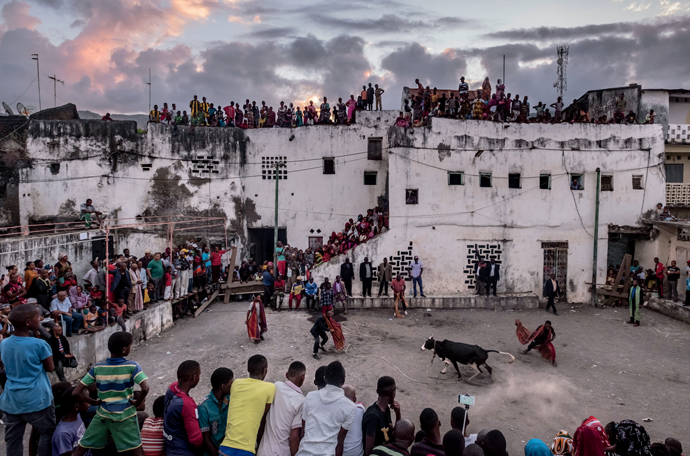
A bullfight known as the tam-tam de boeuf, part of wedding celebrations at the sultan’s palace in Domoni
The préfet of Mayotte, Dominique Sorain, arrived here in 2018 to find the island paralyzed by protests. Amid a general strike, citizens had set up roadblocks and were marching in the streets to demand action against illegal immigration. Some were taking things further, forming vigilante groups that were rounding up suspected migrants and handing them over to the police. But at his office overlooking the ferry terminal, Sorain told me that things could have been even worse.
“There were Mahorans who wanted to kick the Comorians out of their homes,” Sorain acknowledged, “or to stop Comorian children from going to school. This we cannot accept. But it’s also the reason why we can’t let the situation deteriorate, and we have to stop this illegal immigration. If not, the risk is there that we’ll have confrontations between the communities. And above all, there’s the problem that we won’t be able to develop the island.”
A seasoned diplomat, Sorain was several inches taller than anyone on his staff, with graying hair and a deep, sonorous voice. The cast of his lips gave him the disconcerting appearance of being constantly amused, even when he was deadly serious. To him, the problem was one of numbers. The population of the island had exploded from around 50,000, in 1975, to 270,000 today, nearly half of them foreigners. Moreover, he claimed, Mahoran women had around three children per family, while Comorians had six or seven (Comorian women actually have an average of 4.3). Public services just couldn’t keep up. “We need to ensure that the island is no longer attractive to the Comorians,” he told me, “for the Comorians to understand it’s better to stay at home than to come here.”
In the first seven months of 2019 the Mahoran authorities had deported more than 15,000 people, the overwhelming majority of them Comorians. By the end of the year the government was hoping to have expelled some 30,000, a colossal figure representing more than one tenth of Mayotte’s population.
Behind these statistics are men like Capitaine Vincent Cordary, the head of a seventy-two-person unit of the Gendarmerie Nationale sent to Mayotte on a three-month rotation after a stint battling the Gilets Jaunes back home. Cordary had a boyish face, and he greeted me with a firm handshake, agreeing to let me ride along on the unit’s daily roundup of suspected undocumented migrants. The day after my conversation with the préfet, I climbed into the back seat of his unmarked car, flanked by two young gendarmes. Behind us, a second car followed, filled with more officers. They wore black shirts, wraparound sunglasses, black jackboots, and tactical vests outfitted with an assortment of sidearms, tasers, batons, and handcuffs. All but one of them was white, and none spoke any Shikomori. To solve this problem, a local Mahoran policeman rounded out the team. He claimed to be able to tell whether a particular person was from Mayotte or Anjouan simply on the basis of their appearance.
As we drove through Chirongui, a sleepy town on the south end of the island, the Mahoran officer sized up one passerby, shouting, “Orange shirt! Orange shirt!” He slammed on the breaks and the gendarmes leaped out, blocking the man’s path. They politely, but intimidatingly, scrutinized the man’s documents, and after a few minutes were persuaded that he was, in fact, a French citizen. They hastily returned his papers and the patrol moved on. The next target, a man in an Olympique Lyonnais soccer jersey tinkering with a car engine, was not so lucky. He was summarily cuffed and led into the back seat of the second vehicle. His possessions were confiscated, recorded, and bagged up: two cigarettes, some gum, a small fruit I didn’t recognize, and a handful of euros. They would be returned before he was deported, the gendarmes assured him. Within a few hours they had detained six men, all of whom were deposited in the back of a truck while officers filled out the requisite forms. It was the same routine they had practiced every day since their arrival.
At one point, a panicked woman approached, clutching a sheaf of papers. The gendarmes had just arrested her husband in a village a few miles away, she explained. Now he was sitting in the truck with the others. She insisted that he was French and showed the gendarmes the documents, but the man had spelled his name slightly differently when asked by the officers, so they took him anyway. Cordary told me that further checks would be conducted before he was deported. Mistakes, he said, were never made.
The capitaine maintained that the locals were grateful for the team’s work, and no doubt many of them were. But the looks of simmering hatred from the migrants whose lives we had abruptly and dramatically interrupted were hard to stomach. Watching through the windshield as the officers spotted each new target, unaware and vulnerable, I hoped he or she would spot us first and make a run for it. Some did. They knew that the gendarmes were forbidden to enter private homes without a warrant, so the nearest open doorway or garden gate promised a measure of safety, often resulting in frantic chases through the narrow lanes. “It’s incredible how fast they can run in sandals,” joked one of the gendarmes.
“My feeling is that we’ll be doing this job for a very long time,” Cordary said as we drove back to Mamoudzou that evening, over the sound of dance music on the car stereo. He told me that in the span of three months they had already deported several of the same people twice. One man’s record showed that he had been deported twenty-eight times. “This is a rich country in an ocean of poverty,” he said. “I don’t know if we’ll ever be able to stop people from coming.”
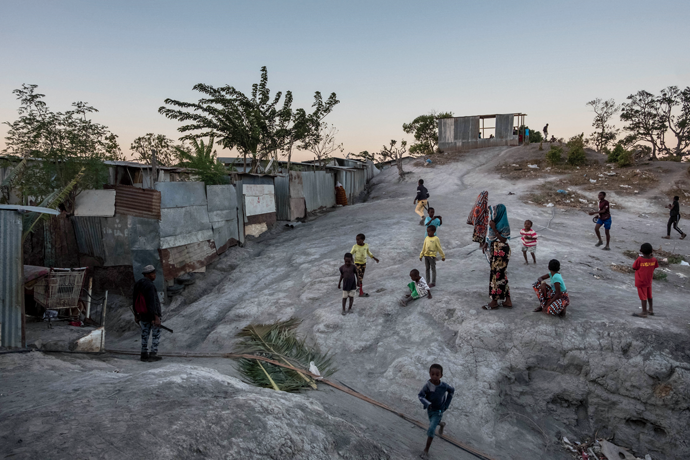
A hillside in the bangas, or slums, of Mayotte
While searching for a smuggler back in Anjouan, I had reached out to Onzardine, my guide from the previous year. It turned out that three months earlier he had finally made it to Mayotte, and we decided to meet. Leaving his neighborhood was far too dangerous, however—Onzardine lacked paperwork and could be sent back to Domoni within twenty-four hours if caught—so I set out to the slums above a town called Majicavo Koropa to find him. A taxi dropped me by the side of the coastal road, and I headed up a set of concrete steps beyond which the bangas rolled into the island’s interior.
Onzardine was living in an unpainted concrete house that looked a lot like the one he had left behind in Domoni. Its owners were currently away in mainland France, and they had allowed Onzardine to live there for the time being, along with twenty-two other members of his extended family. We found a café on a rutted backstreet and ordered Cokes while Onzardine filled me in on the past few months. His decision to make the crossing had been hastened when his cousin fell sick, he explained. With no way to diagnose or treat him in Anjouan, the family had decided to send him to Mayotte, and Onzardine had accompanied him. They had rented a kwassa-kwassa to make the crossing, filling it with migrants to recoup cost. The sea was calm, the trip largely uneventful. Avoiding both the marine patrols and the perilous coral reef that rings the island, it took only three hours to reach French waters, and eleven more to safely reach the coast.
Onzardine’s movements were now restricted almost entirely to the slums around the house. Though he could not legally hold a job, he had been able to find temporary work through his aunt and cousins. One man had paid him 50 euros to unload a shipping container full of bedroom furniture. Another had paid him 150 for three weeks of construction work.
Without the security of a contract, undocumented migrants on Mayotte have little bargaining power, and Onzardine gave me an account of what usually happened when Mahoran employers refused to pay: “You collect a group, and then you go to wait somewhere he will pass, and you beat him.” So far, violence hadn’t been necessary in his case (Onzardine said he preferred to leave justice to God anyway), and the little money he was earning was more than he could have hoped for in Anjouan. He had even managed to send 50 euros back to his mother. Within the month, he planned to start a small underground English-language school for anyone who wanted classes. (The plan had been briefly delayed after his partner in the venture was deported, but he managed to make it back to Mayotte after only a week.)
A few days later, Onzardine offered to show me the neighborhood, and we spent the afternoon wandering along the dirt tracks of the slums, meeting with friends of his from Anjouan who had also made the journey. Their shacks sat clustered together on the near-vertical hillsides in jumbled mosaics of tarpaulin and corrugated sheet metal. Someone had scrawled the French national motto, liberté, égalité, fraternité, in bold letters across a wall, followed by a question mark. Some of the migrants we met were recent arrivals, others had been there for over a decade, but all of them described the constant strain of knowing that their life could be upended at any moment. One woman, terrified of being deported, could count on her fingers the number of times she had left the safety of her house that year. When neighbors called out from across the fence, her husband explained that they assumed I had come to evict them.
Unlike many of his friends, Onzardine had no intention to stay on Mayotte permanently. He found the restrictions on his freedom irksome, and wondered aloud whether it would be better to be back home earning nothing than stuck in this house. He also worried about what would become of him when the owner returned. I asked him where he would like to be in ten years’ time. He wanted to open a small shop, he replied, in the medina near his mother’s house back in Anjouan. He would sell rice, palm oil, and soft drinks. With that, and with his fiancée, Halima, he would be happy. But achieving that dream still required money, and he wouldn’t leave Mayotte until he had enough.
It was dark by the time I left the slums, and Onzardine used his cell phone to illuminate the rocky path back toward the main road. At a certain point, we reached the unmarked border beyond which Onzardine would forfeit the protections of the slums, and he turned back toward his home.
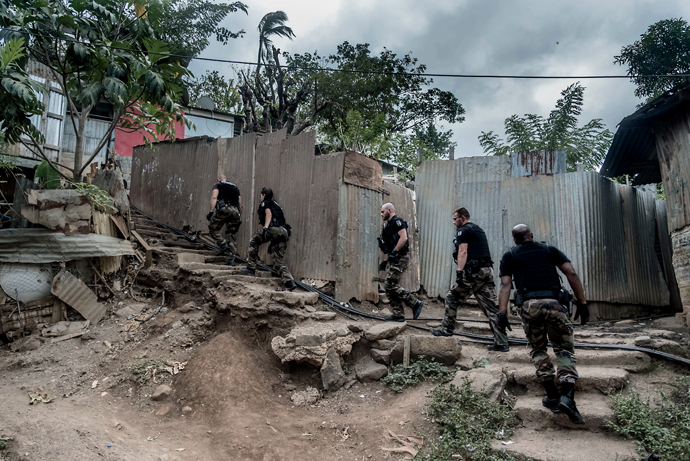
Gendarme Nationale officers on patrol in the village of Majicavo Koropa, Mayotte
My departing flight was scheduled to leave from Grande Comore, and I decided to travel back to the Comoros by boat. A fleet of ferries shuttled paying passengers—mostly Mahorans, along with the lucky few Comorians who had managed to obtain visas—back and forth between the islands. Their other main cargo was deportees.
Walking past the Comorian street vendors on my way to the ferry terminal, I spotted a human-rights worker I had met earlier in the week. Solène Dia had been on the island for a year and a half, working for an organization that helped inform migrants of their legal rights, a job that had earned her hate mail and death threats. A man had been illegally arrested on private property, she explained, and she was trying to halt his deportation. If she didn’t succeed, he and I would likely be on the same boat.
An hour later, I boarded a ferry called La Citadelle and watched over the railings of the top deck as a file of some sixty deportees was ushered aboard. They took their seats in the lower deck on blue, synthetic leather chairs. Distorted music videos played on a television at the front of the room, but nobody was watching. Some of the deportees carried backpacks, and others seemed to have nothing at all. I called Dia to see whether she had managed to forestall the man’s deportation. She hadn’t. But she gave me his number, and I went down to the bottom deck to meet him.
This man, whom I’ll call Youssouf, was slender and neatly dressed in white trousers and a maroon button-up shirt. He had been in Mayotte, where he had a wife and children with residency papers, since 2011, and he was the sole breadwinner of the family. Before he was caught, he had been working for a charity dedicated to educating vulnerable children, most of them the children of deported migrants, who had ended up out of school and living on the streets. Now he too was being separated from his family members, and was terrified about what would happen to them. Anger and despair were etched onto Youssouf’s face in equal measure. He said he felt like he might explode.
“Imagine being in a country where kids are left alone on the streets and treated like dogs,” he said. “Imagine having a family here legally, a wife who’s legal, kids who are legal, and they put me on a boat.” He was apoplectic about having been seized from the private premises of the charity where he worked, and he wanted to know whether I could help overturn his deportation. Regardless, he told me, he would be returning to Mayotte as soon as he could.
Shortly after we began talking, a crew member spotted me in the section reserved for deportees. “Are you a journalist?” the man asked. I said I was. “These passengers are not like the others,” he said, gesturing at the men and women around me. “You can’t talk to them.” Youssouf protested, but the man insisted, and I reluctantly went back to the top deck.
We motored along, parallel to the shoreline, the wake of the boat trailing behind us like a highway through the desert. Towns on the coast slid slowly past, each one ringed by bangas stretching up into the hills. We passed Kaweni, where Saltoun would be holed up with her family; and Majicavo Koropa, where I imagined Onzardine sweating away at a construction site or waiting impatiently for work on the porch of his new home; then Koungou, Longoni, and Bandraboua, before we rounded the northern tip of the island and set a course for Anjouan.
Once we were beyond the reef, there was a heavy swell and the ship rocked violently from side to side. Down in the hold I could see deportees throwing up into yellow plastic bags distributed by the crew. Youssouf was slumped forward, his head in his hands. I scoured the horizon for kwassa-kwassa but saw only the tireless churning of the sea. In time, Mayotte faded away into the distance, Anjouan emerged from the haze, and a deckhand unfurled a Comorian flag, which fluttered, limply, in the breeze.






































































































